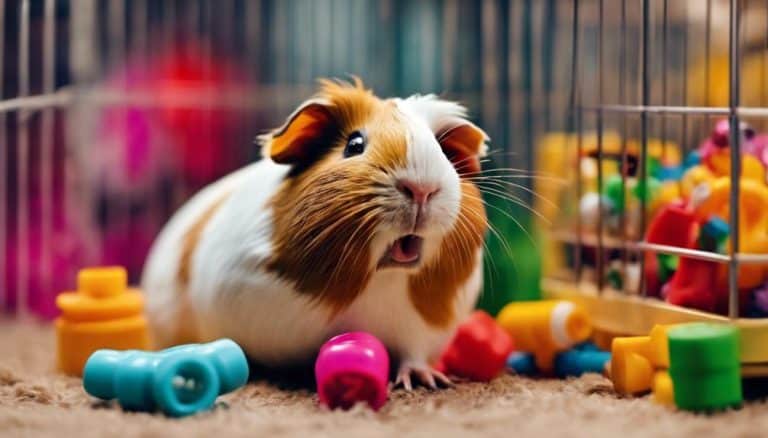Why Do Guinea Pigs Poop so Much
Pooping is like the heartbeat of a guinea pig – it’s essential for a healthy life. Guinea pigs are known to poop a lot, but why is that? In this article, we’ll explore the digestive process of guinea pigs and the factors that affect their poop frequency. We’ll also cover how to manage their waste and the health implications of an unhealthy poop frequency.
Key Takeaways
- Guinea pigs have a unique digestive system that requires a variety of hay and other fiber sources to avoid digestive issues.
- Environmental factors such as exercise habits, stress, and the type of bedding material can affect the amount of waste produced by guinea pigs.
- Unregulated elimination and inconsistent dietary changes can lead to health implications such as inflammation of the intestinal lining, poor absorption of nutrients, and the development of parasites.
- Proper care, including providing a balanced diet, regular cleaning of cages, and monitoring poop production, is essential for maintaining the health and wellbeing of guinea pigs.
The Digestive Process of Guinea Pigs
Guinea pigs possess a unique digestive system that allows them to process large amounts of food, resulting in a high volume of excretory waste. This is due to the fact that guinea pigs cannot digest large amounts of fiber, and therefore must consume a variety of hay and other sources of fiber.
Moreover, guinea pigs are unable to vomit and will often consume more food than necessary. This, coupled with the animal’s exercise habits and dietary changes, can result in an increased production of waste. As guinea pigs are prone to digestive issues, it is important that their diet is closely monitored and that their environment is kept clean and free of harmful bacteria. With appropriate care, guinea pigs can remain healthy and produce waste in a normal, expected frequency.

Factors That Affect Guinea Pig Poop Frequency
Frequency of guinea pig excrement can be affected by various factors, such as:
- Eating habits
- Bedding material
- Activity level
- Stress
- Quality of diet
The amount of food a guinea pig consumes can be a major factor in how often they produce droppings. If they are overfed, their digestive system will struggle to process it all and they may produce more poops than normal. On the other hand, if they don’t receive enough food they may not have enough energy to digest properly, resulting in fewer droppings.
Bedding material is another factor that could influence the amount of droppings a guinea pig produces. If their bedding is too soft, it can be difficult to pass droppings through it. Some materials, like wood shavings, may be more difficult to pass than others.
The activity level of a guinea pig can also impact their poop production. If they are very active, they may be able to digest their food better and produce fewer droppings. On the other hand, if they remain inactive, they may not be able to digest their food properly and may produce more droppings.
Stress can also play a role in how often a guinea pig produces droppings. If they are stressed for any reason, their digestive system may not be able to process their food properly, resulting in more droppings.
Managing Guinea Pig Waste
Properly managing guinea pig waste is an important part of providing a healthy and clean environment for the pet. It is essential to provide the proper nutrition to your guinea pig in order to maintain healthy waste production. This can be done by offering a variety of hay, fresh vegetables, and fortified guinea pig pellets. Additionally, to properly manage guinea pig waste, it is important to clean cages regularly. This is because guinea pigs are very clean animals and they like to keep their cages fresh and dry. Cleaning should include replacing bedding, wiping down surfaces, and spot cleaning any soiled areas.
Keeping a routine cleaning schedule can help keep your guinea pig’s waste to a minimum. Furthermore, providing a clean and comfortable environment for your guinea pig can help them stay healthy and happy.
Health Implications of an Unhealthy Poop Frequency
An unhealthy guinea pig poop frequency can have detrimental health implications for the pet. Unregulated elimination can lead to a variety of issues, such as:
- Irritation and inflammation of the intestinal lining
- Impaired digestion due to inconsistent dietary changes
- Poor absorption of essential nutrients
- Development of parasites
- Imbalance of gut flora due to lack of digestive supplements
These issues can not only affect the guinea pig’s overall health, but can also lead to more serious and life-threatening health conditions if left untreated. Proper diet, digestive supplements, and regular monitoring of the guinea pig’s fecal production are essential for avoiding these health issues.

Conclusion
Guinea pigs are remarkable creatures with a complex digestive process that can be affected by a variety of factors. By understanding the intricacies of their digestion, owners can properly manage their waste and ensure their pet’s health is not compromised. With a little bit of knowledge and a lot of care, owners can ensure their guinea pig is pooping in a timely and healthy manner.







